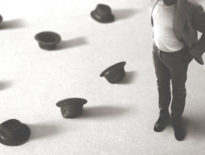In everyday life, whether we like it or not, we rely on the information provided by experts or specialists. However, no authority deserves blind trust. When we take someone’s word for granted simply because that person is an authority, we make the logical mistake called “appeal to authority.”
Enhance your critical thinking. Read more of our articles on the topic.
Every day we put our trust in the experience and good intentions of the various people in positions of authority, usually without consciously checking the reasons we do so. We know what the weather will be like, what foods are healthy or not and that the pills from the pharmacy contain precisely the active substances on the leaflet, because that’s what we are told. Without trust in authoritative sources, our lives would be extremely difficult, if not impossible. However, when this trust is not solidly motivated / argued, we are wrong to grant it. It’s true that sometimes the consequences can be insignificant (for example, a local gives me the wrong route for a bus, but I’m not in a hurry so it doesn’t matter). At other times, however, the consequences can be very serious (an early-stage cancer patient threatens his own life by opting-out of chemotherapy and putting all his trust in a diet with dubious medical evidence to back its efficacy). We can protect ourselves from impostors or evildoers by following a few key steps.
Assess competence
Not everyone who claims to be an authority in a field really has the skills of an expert. A person without medical education who sells essential oils at a premium can use seemingly scientific terms such as “treatment protocols” to describe as convincingly as possible the usefulness of the product they want to sell, but this is not evidence in itself that the proposed treatment is effective.
Many people mistakenly assume that if they are surrounded by pretentious terminology that they do not fully understand, the various products with questionable origins and effects or the health books written by pseudo-specialists are probably scientifically validated. The world of trade is full of products with deceptive qualities, promoted by false experts.
Numerous Eastern-European investigative journalists have revealed the existence of commercial networks that recruit their clients from among retired seniors, whom they fool by selling them products at a premium price, in impressive presentations that take place in luxury hotels. Pots, graters, mattresses with magnets, massage mattresses and many other products with exaggerated benefits, or supported by so-called experts from fake institutions, end up in the homes of the seniors deceived by these impostors.
Evaluate transparency / integrity
It’s not just impostors who promote lies. Even genuine experts can promote distorted truths or even lies. His competence may be unquestionable, but this does not guarantee that the expert will fully express his knowledge. Real experts may have ethical shortcomings or hidden motives, so they should not be invested with blind trust.
Between 1946 and 1948, several thousand needy Guatemalans (soldiers, prostitutes, detainees, psychiatric patients, children from state schools, institutionalised orphans, peasants) were infected with syphilis, unknowingly, while participating in a scientific experiment. The research teams, led by American doctor John Charles Cutler, intentionally infected them with syphilis and other sexually transmitted diseases to test the effectiveness of penicillin in treating the disease. For the same purpose, the authors of the experiment left a group of subjects completely untreated and at risk of death, to monitor the evolution of the disease in the absence of any drug. It was not until October 2010 that the US president officially apologised to Guatemala for what had happened in those years.
Sources of information that at one time enjoyed authority and a good reputation can have a change in profile. The British Daily Mail had been a reliable source for many decades, but in early 2017, Wikipedia editors voted to stop using the Daily Mail as a source of information, concluding that it is no longer “generally reliable“.
Insist on solid arguments
We have the right to hold accountable the authorities who demand our compliance: from the politicians who formulate the laws to the doctors who need to inform us on how they plan our treatments, so that we can make informed decisions about our options.
Especially on controversial topics, such as those in the field of so-called “alternative medicine”, or even on scientifically supported topics where there is no consensus, we need to develop a sense of rational orientation amidst divided opinions—not in order to become experts, but so that the decisions that affect us are not simply influenced by the charisma or the reputation of some. “Because I said so” is not an argument, not even for a child. Why would we accept it as adults?
The expert’s opinion is not the absolute truth
Even experts who deserve their name can be wrong. They may be unwittingly influenced by subjective arguments, may not update their knowledge often enough, or may make logical mistakes, as anyone can.
It is important, therefore, that when we take information from experts into account we pass it through the filter of our own reason, aware that the position of authority is not the same as holding the absolute truth.
In the Middle Ages, when the clergy sold indulgences to believers, most people did not realise that this practice was as foreign to Scripture as the false saying, “Believe and do not search.” Echoes of this attitude can still be heard today in churches that intoxicate their trusting parishioners with the message, delivered in many different ways, that the suffering of believers (even cancer) is a result of their spiritual deficiencies. The church does not have the power to classify depression as a failure of faith, and the adoption of a religious creed does not justify treating doubt with dogmatism.
In short
No authority deserves blind trust. When we take someone’s word for granted only because that person is an authority, we make the logical mistake called “appeal to authority.”
To avoid error, we must first check whether the person with authority has recognised competencies in the subject matter. (Did the author of the recommended article or health book study pharmacy / medicine at an accredited institution?)
Can we be sure that what they convey to us is their complete and real knowledge? (Does the expert who supports a particular economic policy give a complete picture of its real impact?)
Does the person with authority have anything to gain / lose from the information they transmit? (Does the doctor who recommends a chain of pharmacies or a laboratory have a contract with them?)
Is the information provided accompanied by verifiable arguments? (Does a clerical authority that preaches a particular theological interpretation give us the arguments and sources of authority on which it is based?)
Enhance your critical thinking. Read more of our articles on the topic.
Alina Kartman is a senior editor at ST Network and Semnele timpului.



















